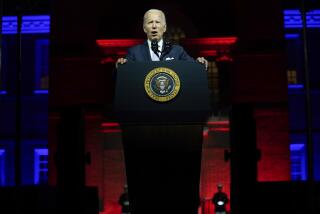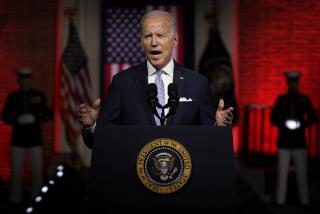Bush Backs Attacks on ‘Freedom’s Enemies’
- Share via
WASHINGTON — President Bush made a case Monday for preemptive strikes against terrorists that seek weapons of mass destruction for use against the United States and other nations, saying “we will oppose the new totalitarians with all our power.”
“With the spread of chemical and biological and nuclear weapons, along with ballistic missile technology, freedom’s enemies could attain catastrophic power,” Bush told a group of about 100 world conservatives gathered for a White House dinner.
“And there’s no doubt that they would use that power to attack us.... We will oppose the new totalitarians with all our power.”
In an earlier speech before the group, the International Democrat Union, Vice President Dick Cheney said the United States will not shy away from first strikes when it acts against terrorists.
Cheney said a strike-first military policy is necessary because past approaches to world security--Cold War deterrence, summits and treaties--will not work against terrorists who have no single base of operation and “nothing to defend.”
“Grave threats are accumulating against us, and inaction will only bring them closer,” he said. “We will not wait until it is too late.”
The IDU, a collection of conservative and moderate-to-right politicians, responded favorably to Bush’s anti-terrorism coalition. The group issued a statement supporting the president’s approach on expanding the anti-terror fight and denying dangerous weapons to “terrorists and hostile states.”
“We believe the coalition must be bold, not complacent, in addressing these threats,” the statement read. “The nature of this threat and the risks of doing nothing to combat it must be clearly understood. We support fully the policy that this threat must be defeated.”
Bush plans to formalize the “strike first” policy when he submits his first national security strategy to Congress by early fall.
White House spokesman Ari Fleischer said Monday that the document would incorporate various foreign relations and national security policies that Bush has articulated since Sept. 11, including new demands that poor countries make political and economic reforms in order to receive U.S. aid.
Specifically, Cheney said, Iraq poses a threat because its leader, Saddam Hussein, has shown a willingness to use weapons of mass destruction and an ability to link up with terrorist networks.
More to Read
Sign up for Essential California
The most important California stories and recommendations in your inbox every morning.
You may occasionally receive promotional content from the Los Angeles Times.













